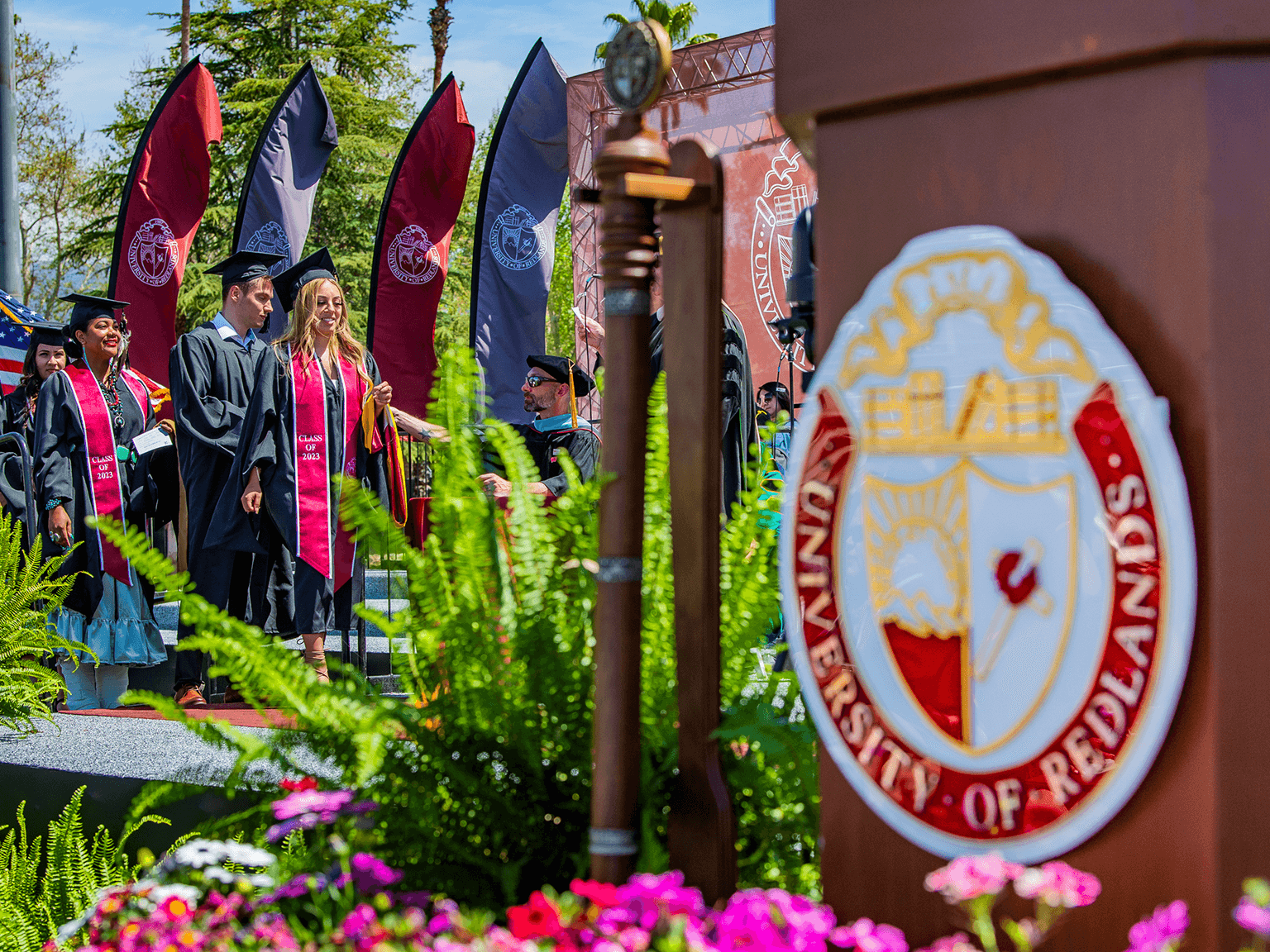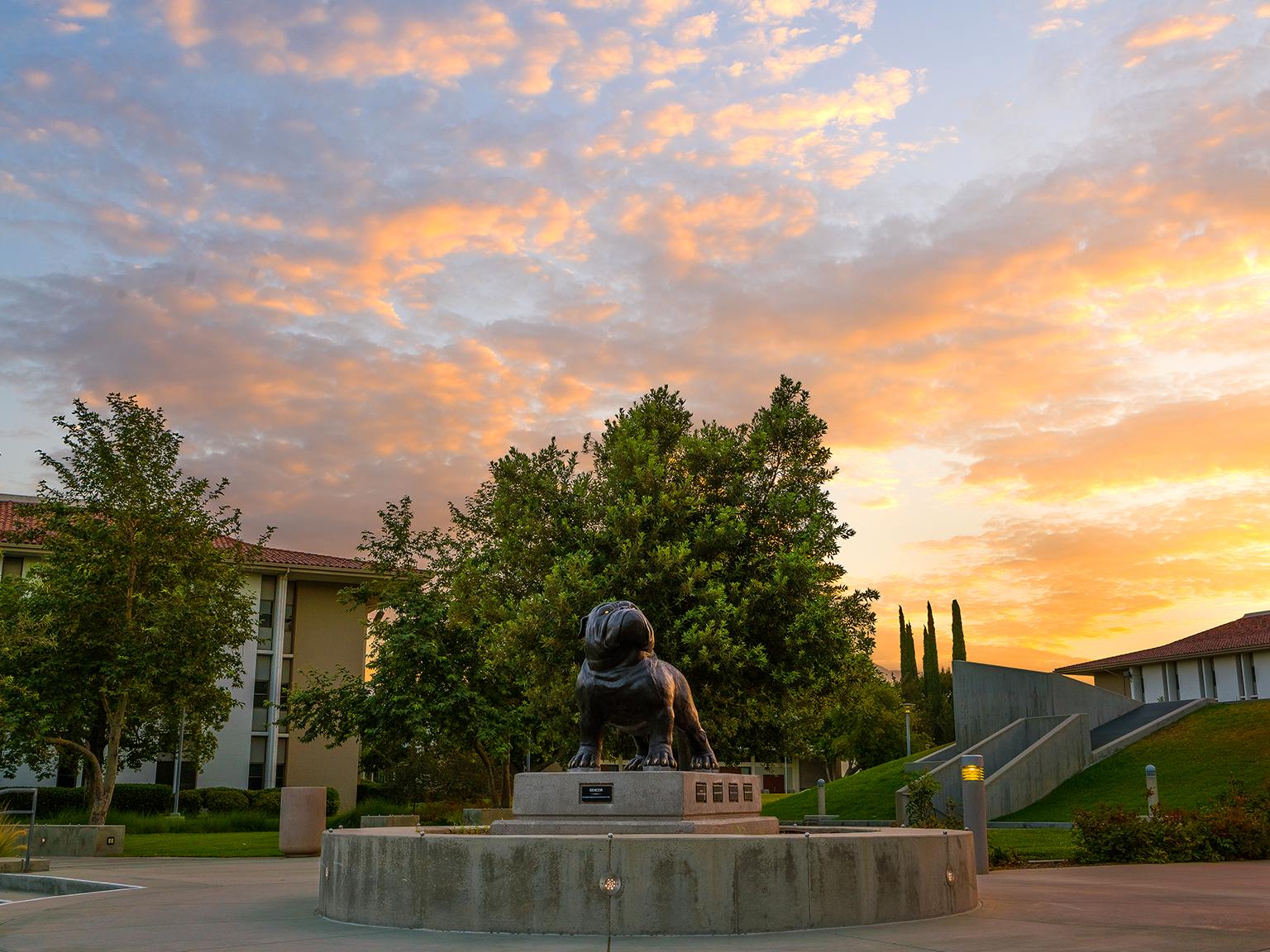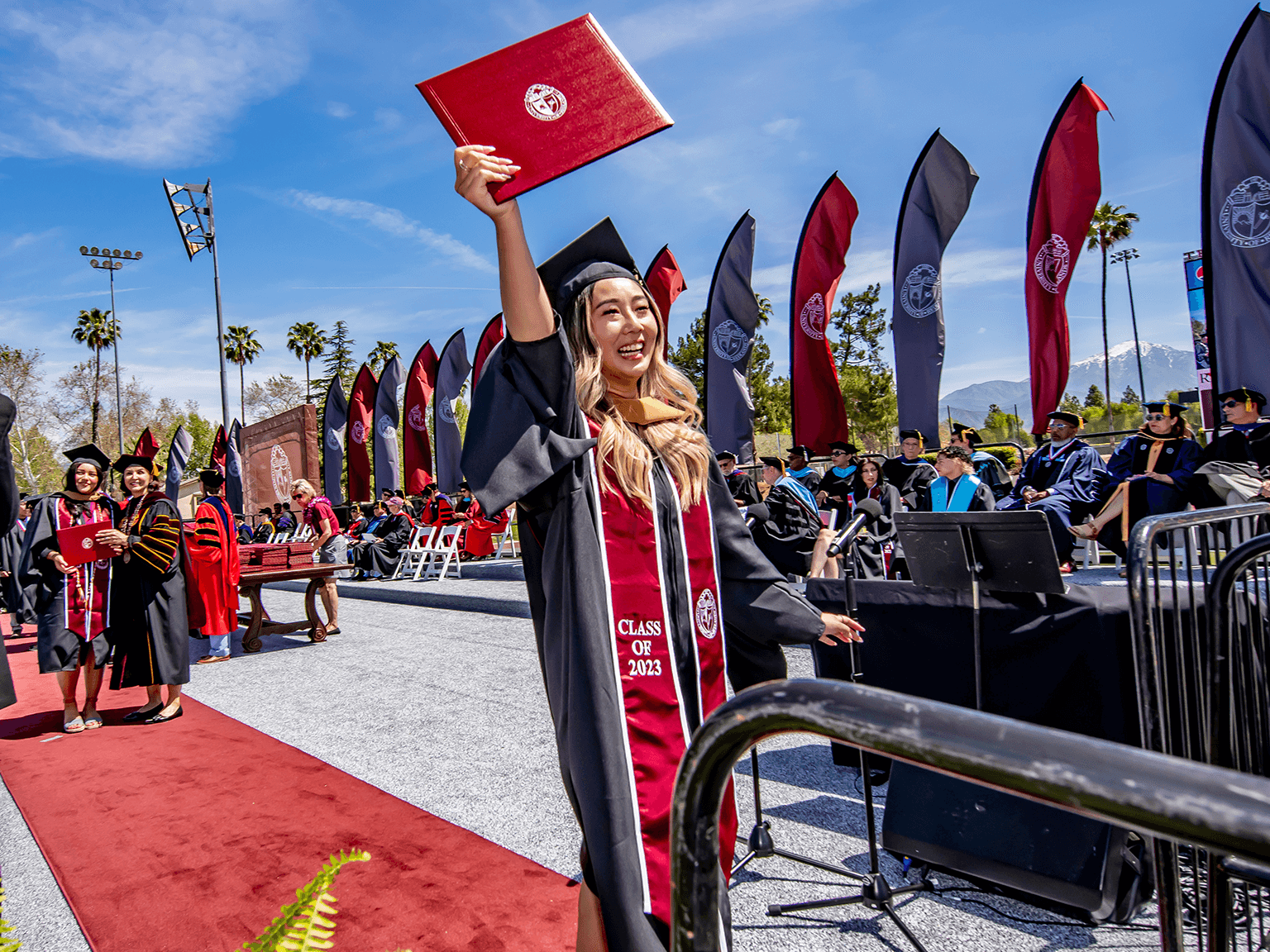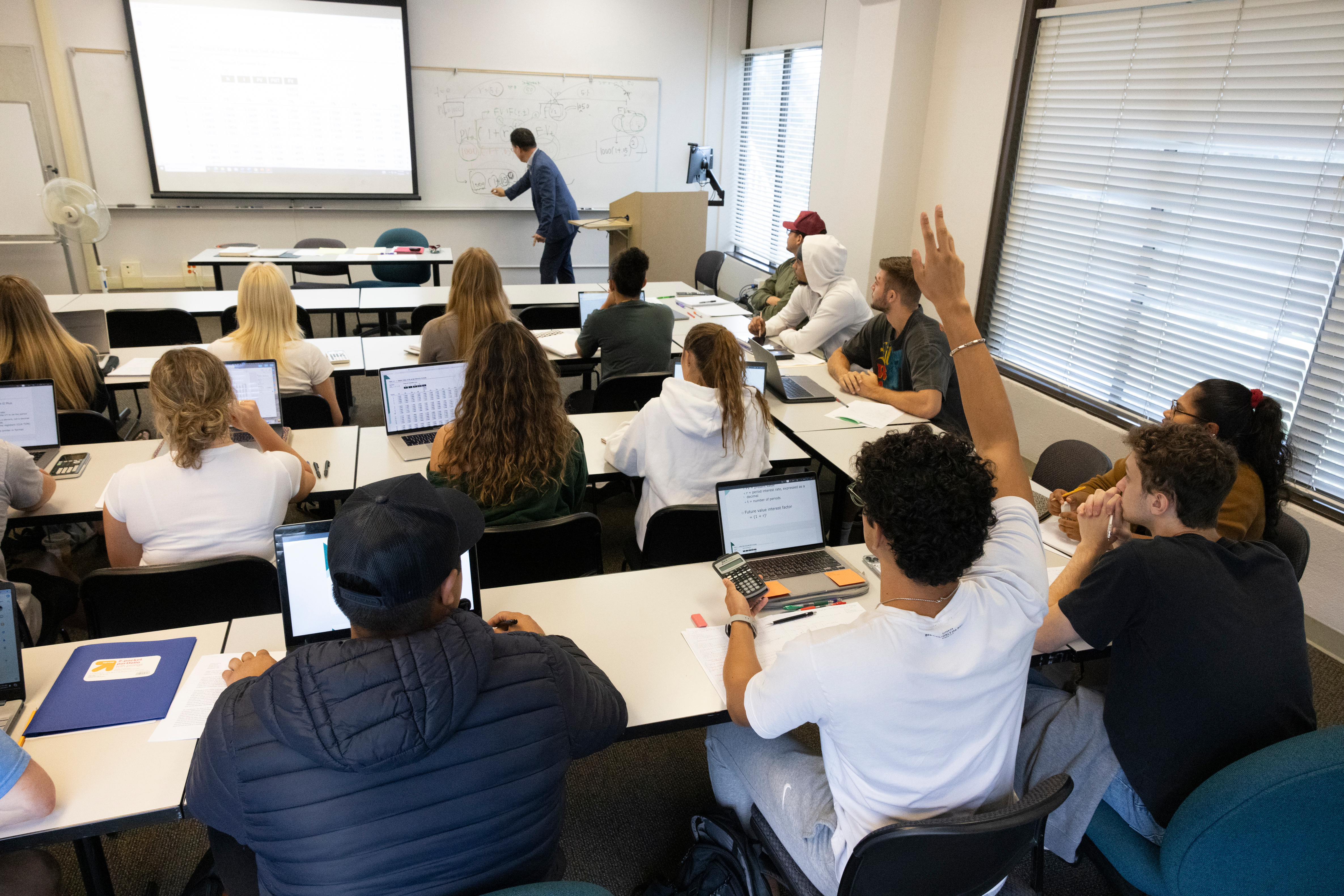The First-Year Seminar (FYS) program connects you with the liberal arts values and practices that are the heart of undergraduate education at University of Redlands. FYS serves as your home base, offering you space to confront increased responsibility, learn from setbacks and mistakes, and develop personal strategies to succeed.
Throughout the program, your FYS professor and peer advisor will connect you to the resources and skills you need to thrive, while demystifying college expectations during your transition from high school to college. Your FYS professor will serve as your initial academic advisor, helping you choose courses and chart an academic path. Meanwhile, your peer advisor, a current student nominated by faculty and trained in academic peer mentoring, will provide insights on navigating the university from a student's perspective.
You'll meet your FYS professor and peer advisor during New Student Orientation. The FYS program will continue throughout the fall semester, providing a uniting and unique experience as you begin your college journey at Redlands.
Fall 2025 First-Year Seminar Course Descriptions
Read through the 2025 FYS course descriptions to learn more about FYS course offerings.
Course Description: The Johnston FYS is a chance to learn more about the Johnston adventure. You’ll get to know your Johnston Community and meet staff members across campus who be part of your educational journey. We’ll also engage in a variety of media such as reading, videos, podcasts, and visual arts to learn more about each other. Students will have support in the academic transition to college, including expectations for college work, time management, and resources. We’ll plan community events, play some games, and embark on this adventure together.
Faculty: Julie Townsend
Course Description: The Music First Year Seminar is intended for all students planning to major in music. It will set the stage for the rigorous course of musical training that you will undertake at the University of Redlands Conservatory of Music. As a class, we will be introduced to a wide variety of topics that are important to the emerging professional musician through on-going reading, listening, and writing projects, guest lectures from music professionals and current Conservatory faculty, and in-class discussions and activities. The goal of this seminar is to give each student a solid foundation in the culture and expectations of studying music here at Redlands and beyond, as well as to give each student the tools to efficiently and effectively progress musically, academically, and professionally.
Faculty: Anthony Suter
Course Description: More people are traveling than ever before for recreation, education, and business. In addition, millions of people have migrated across national boundaries to seek economic opportunities or escape political turmoil, persecution, or war. The field of psychology is central to understanding these travel experiences. In this seminar we will use a variety of readings, film clips, and activities to investigate such questions as: What accounts for instances of outrageous tourist behavior? Can our personality traits predict our desire to travel? What are the causes of and interventions for anti-immigrant prejudice? We’ll learn that psychology can help us to challenge our stereotypes, cope with jet lag, try new foods, avoid getting lost, learn a new language, increase our intercultural competence, and reduce the stress of adjusting to an unfamiliar culture. This course is ideal for students considering study abroad but will be useful for anyone seeking to become more globally minded.
Faculty: Susan Goldstein
Course Description: The course will focus on the principles and techniques of effective communication in different business situations, and the development of interviewing and collaborative problem-solving skills. Emphasis will be placed on inter-personal communication in the age of social media in the corporate world; the nature of inter-group dynamics and communication; and the listening and speaking skills essential to communicate in the 21st Century business world. Fundamentally this is a basic speech class with emphasis placed on developing effective oral communication skills.
Faculty: Bill Southworth
Course Description: Contemplation of nature has been associated with the greatest cultural achievements in China and Japan. This First Year Seminar will examine this dynamic cultural phenomenon. We will study Chinese wilderness poetry, Chinese landscape paintings, Japanese haiku, Zen and the Wabi-Sabi aesthetics, Chinese literati garden culture, Japanese dry landscape garden culture, the Seven Sages of Bamboo Groves, etc.
Faculty: Hongwei Lu
Course Description: In this course, we will take a scientific approach to studying the anatomy, physiology and behavior of mythological and fantastical creatures, drawing inspiration from classical literature as well as pop culture. Throughout the semester, we will learn about different body systems and with this knowledge, make assumptions about the functional biology of imaginary creatures. The 2025 version of this seminar will also incorporate biology relevant to the animals covered in our campus read book: Fuzz: When Nature Breaks the Law by Mary Roach.
Brief: The one about Fantasy Creatures: Apply concepts from biology to mythological and fantastical creatures from literature and pop culture.
Faculty: Bryce Ryan
Course Description: How do people work together to create and sustain life and well-being? What roles do ideas like competition and cooperation play in this economic coordination? Board games can offer a hands-on way to explore social and economic issues and to better understand human interactions and institutions. In this course, we will learn through playing boardgames about different economic concepts, such as markets, workers’ rights, climate change, social norms, and financial literacy. Playing the games will serve as an introduction to a set of issues that we will read about and discuss further, providing an unconventional – but meaningful – introduction to economics.
Faculty: Nick Reksten
Course Description: What is love? Is it really all you need? Where is the love? In this seminar, we will explore literary love: classical, modern, Western, Eastern, romantic, familial, unrequited, dangerous. We’ll look at love and loss, how people talk (and don’t talk!) about love, starting with Plato’s Symposium, then explore a range of literary genres over time. We will look at love through many lenses, across cultural and generational bounds, at how love structures relationships between “self” and “other,” intimately, socially, collectively. We will focus on practicing methods of literary interpretation and analysis; helping you hone your views and a voice to express them; and cultivating foundational skills and scholarly practices for University success. This seminar will be student-focused, interactive, and collaborative, involving both group projects and individual writing. Its success will be determined by you, so bring your enthusiasm, open curiosity, and eagerness to learn!
Faculty: Sharon Oster
Course Description: Rumor, scandal, dirt: gossip is called many things, and is one of the most common—and most condemned—forms of communication. In this seminar, we will explore gossip in American history and culture over the last four centuries, from the Salem witchcraft crisis of the 1690s to the free black press of the early 1800s to the post-World War II red scare to modern celebrity culture. Gossip can provide personal enlightenment, pleasure, and pain; it can serve as a tool of the powerful, the disenfranchised and everyone in between. Gossip can celebrate and/or condemn; it can include or exclude; it can build and/or undermine community. We will take gossip seriously to consider the important personal, cultural, political, social, and economic work it performs.
Faculty: Kathy Feeley
Course Description: While conquest and commerce have propelled people onto the open roads and seas for centuries, the notion of travel for pleasure, fulfillment, or self-discovery is a relatively recent invention. This interdisciplinary first-year seminar examines the history and ethics of tourism. How has technology enabled new types of travel? How is travel an exercise in meaning-making, and how is it a form of consumerism and escape? What ethical considerations should be made when turning traumatic histories into enticements for tourists (e.g. “dark tourism”)? Our class will consider these questions and more during our fall 2025 seminar on the main campus of the University of Redlands. We will continue our studies in Ireland in May 2026, spending approximately ten days visiting and analyzing some of the world’s top tourist destinations. This seminar represents a unique opportunity to study the complexities of tourism in the modern world by experiencing its joys and contradictions for yourself.
Faculty: Jessie Hewitt
Course Description: From sports to the stock market, poker to politics, people look to choose winners. What separates good pickers from the rest? Successes depicted in movies like 21 and Moneyball suggest that the use of statistical, probabilistic, or mathematical models can give the picker an advantage. This course will examine some of the tools that can provide the picker with an edge. While our focus will be primarily on sports, and in particular baseball where sabermetrics was born, these methods can be applied to many areas; the techniques underlying sabermetrics were instrumental in helping Nate Silver correctly pick the winner in all 50 states and the District of Columbia during the 2012 presidential election. No prior knowledge of statistics or sports is expected, although a fan’s knowledge of baseball will be helpful.
Faculty: Jim Bentley
Course Description: Dive into the hidden language of buildings and cities in this mind-opening First Year Seminar! Explore how power dynamics shape our urban landscapes—from hometown Redlands to historic European capitals. You’ll learn the “language” of classical architecture, and discover how towering columns, grand facades, and elegant squares and crescents aren't just aesthetic choices but expressions of cultural and political authority. See how European design principles jumped oceans to influence American cities, and develop a new lens for understanding the built environment everywhere you go.
And the highlight? A transformative trip to Salzburg, Austria, at the end of the academic year! You'll stay in the sixteenth-century Marketenderschlössl and experience firsthand the medieval-meets-Baroque cityscape that generations of Bulldogs have explored.
Course Description: This seminar explores the extraordinary world of both the creation and interpretation of American constitutional law. To that end, we will analyze the written works of influential political theorists and jurists. Our overarching objective is to acquire an enlightened appreciation of the principal tasks that confronted the Constitution’s Framers and those entrusted with their legacy: to organize and define governmental power, and to enumerate spheres of individual autonomy into which that power may not trespass.
As for power, questions about the human condition and the purposes of government will be raised, along with controversies focusing on the exercise of judicial power, on the conduct of war, and on tensions inherent in a federal republic. In terms of individual autonomy, we will explore doctrinal understandings of free speech, press, and religion, as well as issues involving criminal procedure, forms of punishment, and privacy claims linked to sex, marriage, drugs, and death.
Faculty: Art Svenson
Course Description: In the United States most people have some sort of reaction to the terms Islam or Muslim, yet many Americans have never knowingly met a Muslim or formally learned about Islam. Where has their knowledge about Islam come from? In this class, we will analyze the ways in which Muslims and Islam are represented in American news, film, and television. We will explore such media outlets to understand representations of Islam in America. We will consider how events such as honor killings and terrorist attacks are represented not only as horrific events, but also as inherently ‘Islamic.’ This course will encourage close historical and contemporary analysis of multiple representations of Muslims and their real impact on the lives of Muslim men and women, understanding what Evelyn Alsultany calls post-race racism. This class does not assume any prior knowledge of Islam, Muslims, or the media.
Faculty: Sana Tayyen
Course Description: The class will examine traditional Native American approaches to health, the current state of Native American wellbeing, and efforts to reclaim Native ways of healing. For a significant portion of the semester, the class as a whole will select topics to explore as well as the readings. There will be no books to purchase or fees associated with the class. Students will also be taught a set of hard and soft intellectual skills to better prepare them for success in their academic careers and beyond. The hard skills will involve techniques and software to write research papers. For the soft skills, students will practice skills applicable to successful job interviews and receive instruction in multicultural listening techniques. The class is general in nature and is suitable for any student interested in a career in the health sciences, as well as those interested in race relations, social justice, and other causes.
Faculty: Larry Gross
Course Description: The History Channel says aliens helped build the pyramids. Netflix says refugees from Atlantis taught advanced technology to the Maya. Archaeologists say this is all bunk and that the wonders of the ancient world are the product of local human ingenuity and effort. In this FYS, we’ll learn how to find reliable sources of information – in archaeology and beyond – to evaluate competing knowledge claims like these. The goal is understand how we know what we know. Because if you don’t know that, you don’t know anything at all.
Faculty: Wes Bernardini
Course Description: Using a digital camera, students will explore environments and meet in there surrounding areas to aid them in collecting original stories in the form of photography, video and perhaps some text. These stories will stem from select themes which will provide the basis for the narrative arc of storytelling projects. Students will use both digital as well as historical photographic processes and will have regular critiques of their work. Students will receive as well as give thoughtful feedback of others’ work.
Faculty: Tommi Cahill
Course Description: Solo performance is born from the historical practice of one individual performer telling a story. This class investigates the tradition in the contemporary theatre. The course is based on the premise that the live theatrical experience is transformative. We will be looking at specific contemporary theatre artists and how they have used solo performance as a way of expressing perspectives about society, culture, and/or personal experience with the goal of affecting productive social change. Using the artists we study as models of craft, students will learn about style, dramaturgical structure, theatrical conventions, and then create their own solo performance piece based on their own lived experience.
Faculty: Gregory Ramos
Course Description: Explore how movies about the end of the world connect with our understanding of media and society. We'll look at how films predict, reflect, and even shape our fears about global problems. This course uses different ways of analyzing media – like looking at story patterns, symbols, and how different groups are represented – to understand these films. We'll see how movies use visuals and stories to make us think about big issues and our place in the world.
Faculty: Ross Conkey
Course Description: “Rhythm of the Saints”: studies, practices, and reflections on service, leadership, and practical applications for making change. This course examines the lives of global, national and local figures who have made service to others an integral part of their lives and through that service changed the world. The course will examine and study the qualities and principles of community engagement and historical figures with legacies of living lives centered on others. The class will meet and serve alongside community members who feed the poor, visit the elderly, garden, nurture abandoned animals, teach the young - and we’ll also take deep dives into resources for success at Redlands. While students will meet local activists and volunteers and learn the difference between service-learning, community service, volunteerism, and activism they will also investigate what is takes to succeed in their collegiate journey.
Faculty: Tony Mueller
Course Description: Introduction to the concepts of artificial intelligence in the context of information technology. Students will develop an understanding of AI principles, including machine learning, automation, and data analytics, and how they are applied to IT systems. This course emphasizes the role of AI in shaping modern IT infrastructure, cybersecurity, and ethical decision making, equipping students with foundational knowledge and practical skills applicable to any degree, industry, or profession.
Faculty: Cheyne Murray
Course Description: This course will introduce students to the materials, techniques, terms, and critical issues related to drawing on site. Students will be drawing in different locations on and around campus to learn the basics of observation and measurement, contour and continuous line drawing, application of value and texture, gestural drawing,
Special note: this FYS section was originally open to continuing students and will have around 9-10 non-first year students in the course.
Faculty: Munro Galloway
Course Descripción: (SPA: Seminario de Primer Año) Entendiendo el mundo hispano mediante su arte, música y literatura.
En este seminario examinaremos desde una perspectiva histórica, ejemplos significativos del arte, la literatura y la música tanto española como hispanoamericana comenzando a finales del siglo XV. En la primera etapa veremos la España renacentista y cómo este mundo moldea, en parte al mundo que se crea en las Américas, dando a luz finalmente a las culturas de Hispanoamérica. Se leerán por ejemplo cuentos e historias cortas tanto de la cultura española como de algunas culturas indígenas, y seguidamente algunos hitos representativos, así como personajes de alguna importancia para entender mejor el desarrollo cultural de las Américas. La última parte de la clase hará énfasis en la cultura popular, la música y el arte, pero también la arquitectura y la formación de las naciones de América. El curso se impartirá en español. Además, como este curso en parte se debe concentrar en su éxito universitario, se dedicarán 25-30 minutos de clase para traer tutores de varias disciplinas y trabajar en trabajos y tareas que causen dificultades al/ a la estudiante, cuando sea posible se tratará de que el tutor hable español y explique los conceptos en español.
Faculty: Liesder Mayea
(FYS: First-Year Seminar) Understanding the Hispanic World through Art, Music, and Literature.
In this First Year Seminar, we will study significant examples of art, literature, and music from both Spain and Latin America starting in the late 15th century up to modernity using a socio-historical methodology. For example, we will read short stories from both Spain and some indigenous cultures, followed by the examination of representative milestones and figures of importance to better understand the cultural development of the Americas. The last part of the class will focus on popular culture, music, and art, but also on architecture and the formation of the nations of the Americas. Furthermore, since this course is partly focused on your academic success, 25-30 minutes of class time will be dedicated to bringing in tutors from various disciplines to help with assignments and tasks that may be difficult for you. When possible, the tutor will speak Spanish and explain the concepts in Spanish. The course will be taught in Spanish.
Course Description: Learn to juggle! Juggling is an ancient art form revered by cultures spanning the globe and thousands of years of history. Jugglers and mathematicians have always been fascinated by patterns. It is only in the last twenty years that some juggling mathematicians-mathematical jugglers?-discovered a means of describing basic juggling patterns in terms of sequences of numbers called site swaps. This discovery has created a huge interest in mathematics for jugglers and juggling for mathematicians. There are a number of computer programs that beautifully simulate the use of site swap notation on the web. We will also explore novel connections between juggling and topics such as music, knot theory, and the multiple body problem in astronomy. Take this class if you are not afraid of learning new mathematics and either know how to juggle or want to learn.
Faculty: Rick Cornez
Course Description: Taught by a lawyer, professor and former judge with extensive experience working with young adults, children, and families in the legal system, this seminar offers students a unique opportunity to explore personal development through the lens of law, justice, society and critical decision-making. The course begins with counseling-based strategies to help students reflect on their experiences and expectations, articulate goals and identify actionable steps toward achieving them. Students will then examine broader concepts such as the foundations of the American legal system, ethical and unethical behaviors, implicit bias, and the role of effective communication in personal and professional success. Emphasis will be placed on building critical thinking skills and navigating expectations within academic and formal environments.
Guest speakers are anticipated from law enforcement, student affairs, leadership development and the community who will offer diverse perspectives and practical insights. Designed to support a successful transition into university life and beyond, this seminar encourages students to take ownership of their journeys while fostering a deeper understanding of the systems and values that shape our communities.
Faculty: Patrick Taylor
Course Description: Life is a succession of journeys, including the one you are embarking on right now as a first-year college student. Through reading (both fiction and non-fiction), writing, and discussion, we will explore spiritual and physical journeys as a tool for personal growth. Whether the journey’s outcome is triumphant or tragic, we will reflect on the lessons learned on each journey and the impact of those lessons on our own wellness, mindfulness, and the formation of a personal life code.
Faculty: Tom Whittemore




